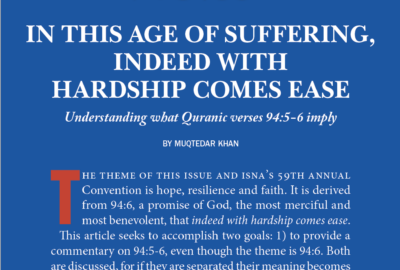Ideas and the Decline/Revival of Islamic Civilization
Human existence has always been dependent on the power of ideas. It was our capacity for ideas that allowed us to take over this planet from other beasts far more powerful than us. It is safe to say that in the very beginning of human life, the fact that ideas are more powerful than power itself was established. The impact of ideas can be felt in three different ways; one, ideas can transform our understanding of life and through that transform the very conditions of our existence (Iman). Two, ideas can transform our conception of ourselves and begin a new reconstruction of the self (Tazkiyyah Annafs). Three, ideas can alter the balance of power between communities and lead to freedom from slavery and oppression (Islah).
But we must remember that all ideas have an expiry date. Once ideas become stale they lose their emancipatory capacity and become oppressive. Ideas that once liberated and transformed a society, if allowed to become dogma, will cause stagnation and decline of that society. Yes, you read me correctly. The same idea can liberate and imprison the individual/collective mind as well. The key to utilizing the power of ideas is to ensure that the human will is always in charge and never subordinated to any old idea.
Ideas are meanings. Without ideas nothing is meaningful. All individuals and civilizations have an idea of the self and an idea of the big picture. These constitutive ideas are essential not only for the existence but the continued growth of the self. If we allow foundational ideas to stagnate then we will lose our vitality and our strength and look like yesterdays pasta.
This is what, I believe, has happened to the Islamic Ummah. Our genesis, our phenomenal and explosive growth and all our past glory, was the sole expression of a divine idea – Islam. The idea of Islam transformed our vision of ourselves, gave us a new meaning of life itself, and as it unfolded we gave birth to one of the most glorious periods in human history.
Before we go any further with this discussion, let me make it clear that there are basically two types of ideas — pure ideas and contingent ideas. Pure ideas are solely the province of the supreme divine being – Allah — and in that sense the unfolding of creation is a continuous flow of ideas from the divine fountainhead. Human beings are only capable of producing contingent ideas. Contingent ideas are nothing but the outcome of the human processing of pure ideas. Pure ideas confront us in the form of revealed texts, material creation itself and as insights garnered through connections with the divine.
The glory of the Islamic civilization emerged as a consequence of the enormous flow of contingent ideas from Muslim thinkers processing the pure idea of Islam. It led to the emergence of several streams of ideas (discourses) fiqh (Islamic legal thought), Falsafa (philosophy), adab (moral science), tasawwuf (spirituality), and Kalam (metaphysics). Islamic science that included mathematics, physics, geology, chemistry, astronomy, anthropology, sociology and historiography developed as the handmaiden of Islamic philosophy.
These streams of contingent ideas continued to flow and enrich not only the Islamic World but also the entire human civilization. Every new stream of ideas added a newer, deeper and richer dimension to the Islamic world. In its time it manifested the zenith of human achievements in both corporeal as well as spiritual sense. This great epoch in human history was essentially the outcome of the human mind processing the pure idea of Islam.
Today, the Islamic Ummah is in disarray. It has not only lost its past glory, but has also lost the capacity to comprehend the virtues and the causes of its past glory. It is in decline and unable to defend or take care of itself. After nearly 100 years of Islamic revivalism in the Sunni world, the best we have to show is the Taliban in Afghanistan! Let us hope that like Iran, Afghanistan too will turn towards moderation and freedom.
I believe the singular reason for this state of affairs is the transformation of a people from processors of ideas to recyclers of ideas. On the moral and spiritual front we are trying to recycle the ideas of our forefathers and on the material front we are just consumers of Western ideas.
Muslims, thanks to their obsessions with contingent ideas like the fiqh literature, have become estranged from the pure idea of Islam, and have also been deprived of their capacity to generate contingent ideas more meaningful to their times. It is this alienation from the creative process of idea generation that has stripped the Islamic civilization of its vitality and its brilliance leaving behind an embittered, insecure and clueless Ummah.
The sooner we realize the absence of ideas and encourage, freedom of thought, creativity, and intellectual self-determination, the sooner will we recover some semblance of our past glory and fulfill our God given mandate of universal moral leadership.









Very enlightening indeed! .
I have been engaging in discussions on the true objective of Islam, with many muslims ,erudite and otherwise.
And I was disappointed in realizibg their helplessness in counterng the radical elements in the Faith. They seem to tacitly agree that it is not possible to defeat a radical theologian in a debate. Your article gives me much insight and hope regarding the message of Islam.
I’m a Hindu who is exploring ways to reconcile the ideological conflict that we have with muslims, and thereby forge a stronger bond with them for the progress of my country,India.
Are you active in G+?